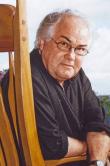Gary Crew was born and educated in Brisbane, Queensland, leaving school at sixteen to work as a draftsman. He attained a certificate in Engineering Drafting from the Queensland Institute of technology in 1970 and continued to work in the field until 1973. Between 1974 and 1983 he worked as an English and history at several Brisbane high schools, while also undertaking a Bachelor of Arts degree at the University of Queensland. In 1979 he completed a Master of Arts in postcolonial literature at the same university. Crew was appointed Head of English at Albany Creek High School in 1984 and was later appointed to the same position at nearby Aspley High School. From 1990 onwards he has worked as a freelance writer and lecturer at both the University of the Sunshine Coast and the Queensland University of Technology. Since the early 2000s he has developed a number of creative writing courses at the University of the Sunshine Coast in his capacity as a senior lecturer and later as an Associate Professor.
Crew's mainstream literary background and experience in Brisbane schools made him aware that traditional text selections were not relevant to many of his students. This made the task of encouraging close reading very difficult. He began writing novels for adolescents in the 1980s in an attempt to provide material relevant to a wider range of high school students. His move to freelance writing has seen him publish many award-winning books, including Strange Objects (1990) and Angel's Gate (1993). His first attempt at writing a horror story, Strange Objects became the first novel in that genre to win major literary recognition in Australia - including the New South Wales Premier's Literary Award, the New South Wales State Literary Award and Children's Book of the Year for Older Children. Angel's Gate attracted similar critical acclaim, winning Children's Book Council Book of the Year Award, along with international attention after picking up the American Children's Book of Distinction Prize.
In addition to his writing career Crew has been engaged as an editor, including series editor for Lothian's After Dark horror novellas. He has also worked in the area of picture books, publishing more than 30, including the ground-breaking 1994 publication The Watertower with illustrator Steven Woolman. The pair later collaborated on a second picture book - Caleb (1996), which according to Steven Paulsen and Sean McMullen crosses a number of genre boundaries, including science fiction, Gothic horror mystery, and dark fiction (p.156). In addition to his novels and picture books Crew has written a number of short stories, with these being published in such anthologies as Spine-Chilling: Ten Horror Stories (1992), The Lottery (1994) and Nightmares in Paradise (1995). He also published a collection of his own short stories, Dark House, in 1995.
Crew's experiments with plot and characterisation are widely admired. His use of the macabre and other forms popular with teenagers has attracted many young readers to his themes of the search for self-knowledge, cultural identity and alienation. In their entry on Crew in the St James Guide to Horror, Ghost and Gothic Writers, Paulsen and McMullen acknowledge his obvious talent, writing: 'His horror fiction is rich in symbolism and metaphor, and whatever genre Crew chooses to write in he explores important human themes such as search for identity, the mystery of life, the awe of the universe and the mortality of humankind (p.158).
 2380216351356643156.png
2380216351356643156.png